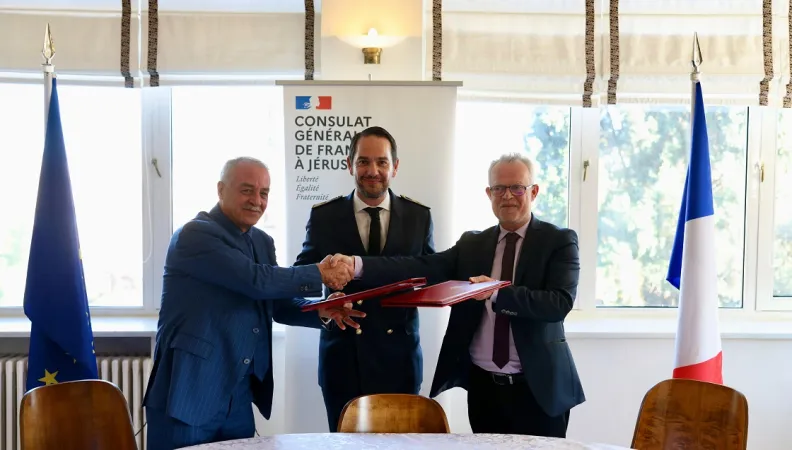Share the page
Strong support from France, with 12 million euros, via AFD, to the Saint Joseph hospital (East Jerusalem) to strengthen the provision of Palestinian health care

East Jerusalem, 09 December 2024 – France strengthens its support to the Palestinian health sector and its historic commitment in East Jerusalem through support provided by the French Agency for Development (AFD), an ambitious project to expand and develop the Saint Joseph Hospital. The funding of 12 million euros provided by France, via AFD, will allow this key player in the health system to help the populations of East Jerusalem, Gaza and the West Bank to improve and expand its services and increase its patients reception capacity. In partnership with the European Union, specific support for energy efficiency measures will ensure sustainability and reduce the hospital’s carbon footprint, through additional funding from PEEB Med.
Mr. Nicolas KASSIANIDES, Consul General of France in Jerusalem, stressed that “this project marks a new stage in the support of France to the Palestinian population, which today faces a major crisis. It is part of our country’s efforts to develop essential services for the population, as well as its commitment in East Jerusalem. This investment echoes France’s mission of protecting the Saint Joseph Hospital, which today occupies a unique place in the Palestinian hospitals network.”
The Palestinian Territories face significant health challenges. The health system must respond to the growing needs of a young population facing highly degraded socio-economic conditions, strong fragmentation of territories and the consequences of the conflict situation, exacerbated since 7 October 2023.
In this context, the Saint Joseph Hospital, founded in 1954 by the French sisters of Saint-Joseph-de-l'Apparition, plays a key role in providing quality care to all Palestinian people. With 155 beds and a capacity of over 96,000 patients per year, the hospital is one of the three largest health facilities in East Jerusalem. It receives 70% of its patients from primary health centres in the region and offers specialized medical services to patients from the West Bank and Gaza.
France’s support, in conjunction with the European Union, will modernize and expand the hospital infrastructure to better meet the demand for health care.
The project will thus aim to:
- Develop the provision of care to the population, through the extension of ambulatory clinical services, the development and modernization of the intensive care unit and the increase of patient reception capacities.
- Support training activities for the strengthening of human resources in the medical sector and the improvement of patient management: increase of spaces devoted to university activities, support for initial training activities, French expertise in the hospital sector.
- Adapt the supply to the long-term challenges. The new premises and services of the hospital will thus integrate gender issues, through inclusive patient care and governance, and environmental sustainability.
Thanks to a strategic partnership with the European Union (EU) under the PEEB Med program, energy efficiency measures will be implemented to reduce the hospital's carbon footprint. This initiative will result in a 57% reduction in the hospital's energy consumption and prevent the emission of 837 tons of CO2 per year. PEEB Med is part of the Partnership for Energy Efficiency in Buildings and is a flagship program of the EU’s Global Gateway initiative.
The European Union Representative Ambassador Alexandre Stutzman added: “I am delighted that the EUR 1 million investment grant will provide the much needed relief and support to St Joseph Hospital in these difficult times. It will facilitate the achievement of energy efficiency, resulting not only in the reduction of energy consumption, but also improving daily lives of hospital staff and patients”
Eventually, and with the parallel support of the Qatar Fund for Development, the project supported by the Saint Joseph Hospital will allow the addition of 17,500 m2, allowing to increase considerably the number of beds available, to accommodate a magnetic resonance imaging (MRI) unit, and expand the gynecoobstetric complex.
